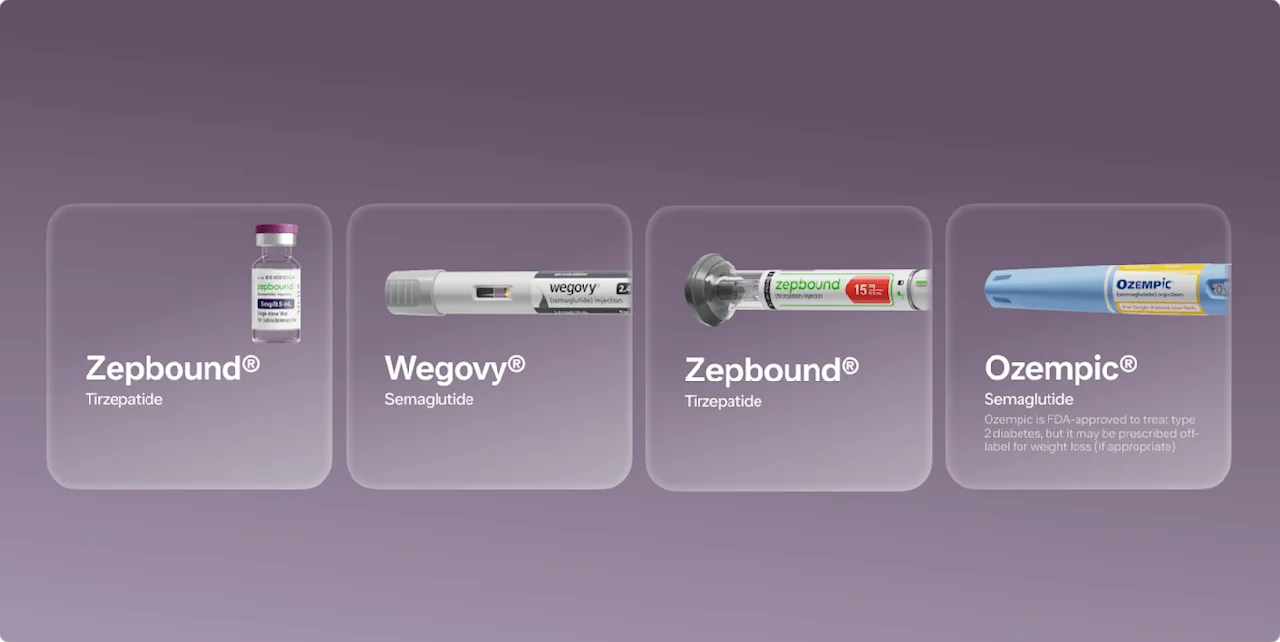Key takeaways
Ozempic is not known to interact with alcohol, but people with type 2 diabetes may want to think before they have a drink
Here's what we'll cover
Here's what we'll cover
Key takeaways
Ozempic is not known to interact with alcohol, but people with type 2 diabetes may want to think before they have a drink
With any prescription medication, it’s a good idea to ask your healthcare provider if it’s safe to consume alcohol. If you’ve been prescribed Ozempic to manage your type 2 diabetes or help with weight loss, you may want to know if you can have a cocktail or a glass of wine (or two) while taking the medication. Ozempic is not known to interact dangerously with alcohol. However, for those with type 2 diabetes, drinking alcohol while taking Ozempic may cause dangerously low blood sugar (hypoglycemia). For those taking Ozempic for weight loss, the extra calories that come with alcohol consumption may stand in the way of your weight management goals. Continue reading to learn more about mixing Ozempic and alcohol.
What is Ozempic?
Ozempic is a type of drug called a glucagon-like peptide-1 receptor agonist (GLP-1). It’s a prescription injectable medication that you self-inject weekly. Ozempic may also be prescribed off-label by a healthcare provider to support weight loss.
Ozempic is primarily used to treat type 2 diabetes. When used in combination with lifestyle changes like diet and exercise or with other diabetes medications such as metformin, Ozempic helps people with type 2 diabetes control their blood sugar levels. Ozempic also lowers the risk of stroke, heart attack, and death in people with type 2 diabetes and heart disease.
Ozempic can help people with obesity or overweight lose weight. When combined with diet and exercise, Ozempic slows the passage of food through the digestive system, helping you feel full for longer and reducing your appetite and calorie intake to help with weight management.
Ozempic Important Safety Information: Read more about serious warnings and safety info.
Can you drink alcohol on Ozempic?
Ozempic is not known to dangerously interact with alcohol. However, that doesn’t mean the combination is safe for everyone. But, whether you take Ozempic for type 2 diabetes, weight loss, or both, there may be reasons to avoid alcohol. Here are six things to keep in mind before you mix alcohol and Ozempic.
1. Alcohol may negatively affect your blood glucose levels
If you have type 2 diabetes and take Ozempic to control your blood sugar levels, you may want to exercise caution when it comes to alcohol. Alcohol can negatively affect your blood glucose levels while taking Ozempic, causing them to drop too low (hypoglycemia). Hypoglycemia can cause dizziness or even fainting. In extreme cases, it can cause coma, seizures, and even death. While that doesn’t mean you can’t drink any alcohol while you are being treated with Ozempic, it’s a good idea to stay on top of your blood sugar levels if you have diabetes.
If your diabetes is well controlled, it’s generally considered okay to drink moderately. That means about two drinks per day for men max and one drink per day for women. If your diabetes is not well controlled, or if you have other medical conditions—such as high blood pressure, liver problems, or high triglycerides—it may be safest to avoid alcohol entirely. Talk to your healthcare provider about your personal risk level when drinking alcohol on Ozempic.
Regardless of whether or not your diabetes is well controlled, people with type 2 diabetes should avoid drinking alcohol on an empty stomach. Drinking on an empty stomach increases the risk of hypoglycemia. Monitor your blood sugar levels when consuming alcohol and watch for symptoms of low blood sugar.
2. Alcohol consumption may reduce the weight loss benefits of Ozempic
If you are taking Ozempic solely for weight loss, you may still want to limit your alcohol consumption. Excessive drinking slows your metabolism, has been linked to overeating, and may be a risk factor for obesity and weight gain.
People who have impulsive tendencies may be more likely to overeat during or after drinking alcohol. Chronic heavy drinking may increase your risk of type 2 diabetes mellitus and pancreatitis (inflammation of the pancreas).
When drinking in moderation, avoid sugary drinks and cocktails containing soda, juice, and syrups. Instead, opt for distilled spirits, wine, and low-calorie cocktails. No matter who you are, drinking alcohol is never without risk. Alcohol consumption may increase your risk of liver disease, heart disease, stroke, cancer, and more.
3. Ozempic may lower your desire to drink alcohol
While some people can drink alcohol in moderation while taking Ozempic, you may find that you don’t want to. Typically, dopamine is released when you drink alcohol, activating your brain’s reward system and giving you that warm fuzzy feeling. While you’re taking Ozempic, however, GLP-1 targets in the reward centers of your brain block dopamine bursts, lessening that good feeling that comes with drinking alcohol. If your brain doesn’t reward you for alcohol consumption, your desire to drink may be lower.
In addition to reducing alcohol use, some studies conducted on animals found that Ozempic and other similar medications may also be able to reduce cocaine, nicotine, and amphetamine use. As a result, scientists are currently exploring Ozempic as a treatment for substance use disorder.
4. Drink in moderation while on Ozempic
While sugary drinks may stand in the way of your weight loss goals, moderate alcohol consumption is typically not associated with obesity (heavy drinking is). Moderate alcohol consumption means no more than two drinks per day for men and one drink per day for women. For perspective, one drink is defined as one 12-ounce beer, 1.5 ounces of liquor, and 4 ounces of wine.
If your main concern is keeping your blood sugar levels in control, limit sugary beverages containing soda and juice, as previously mentioned, and stick to low-sugar options.
5. Alcohol may worsen the side effects of Ozempic
Some people experience nausea, vomiting, and digestive issues while taking Ozempic, and consuming alcohol certainly doesn’t relieve these symptoms. As your body absorbs alcohol into the bloodstream through the digestive tract, it can cause irritation in the lining of your stomach. Additionally, alcohol consumption slows the rate at which your stomach empties. The result is more nausea, vomiting, and digestive issues.
Remember that consuming alcohol is never without risk. While it may be safe to drink moderately while taking Ozempic, have a conversation with your healthcare provider to be sure that consuming alcohol won’t have a negative impact on your treatment plan.
DISCLAIMER
If you have any medical questions or concerns, please talk to your healthcare provider. The articles on Health Guide are underpinned by peer-reviewed research and information drawn from medical societies and governmental agencies. However, they are not a substitute for professional medical advice, diagnosis, or treatment.
Asif, M. (2014). The prevention and control the type-2 diabetes by changing lifestyle and dietary pattern. Journal of Education and Health Promotion, 3, 1. doi:10.4103/2277-9531.127541. Retrieved from https://pubmed.ncbi.nlm.nih.gov/24741641/
Campagna, D., Alamo, A., Di Pino, A., et al. (2019). Smoking and diabetes: dangerous liaisons and confusing relationships. Diabetology & Metabolic Syndrome, 11, 85. doi:10.1186/s13098-019-0482-2. Retrieved from https://pubmed.ncbi.nlm.nih.gov/31666811/
Canadian Agency for Drugs and Technologies in Health (CADTH). (2019). Clinical review report: semaglutide (Ozempic): (Novo Nordisk Canada Inc.). Canadian Agency for Drugs and Technologies in Health. Retrieved from https://pubmed.ncbi.nlm.nih.gov/31305971/
Chamberlin, S. & Dabbs, W. (2019). Semaglutide (Ozempic) for type 2 diabetes mellitus. American Family Physician, 100(2), 116–117. Retrieved from https://pubmed.ncbi.nlm.nih.gov/31305048/
DailyMed. (2022). OZEMPIC-semaglutide injection, solution. National Library of Medicine. Retrieved from https://dailymed.nlm.nih.gov/dailymed/drugInfo.cfm?setid=adec4fd2-6858-4c99-91d4-531f5f2a2d79
Eren-Yazicioglu, C. Y., Yigit, A., Dogruoz, R. E., & Yapici-Eser, H. (2021). Can GLP-1 be a target for reward system related disorders? A qualitative synthesis and systematic review analysis of studies on Palatable Food, drugs of abuse, and alcohol. Frontiers in Behavioral Neuroscience, 14. https://doi.org/10.3389/fnbeh.2020.614884. Retrieved from https://www.frontiersin.org/articles/10.3389/fnbeh.2020.614884/full
Food and Drug Administration (FDA). (2020). Drug trial snapshot: Ozempic. Retrieved from https://www.fda.gov/drugs/drug-approvals-and-databases/drug-trial-snapshot-ozempic
Kase, C. A., Piers, A. D., Schaumberg, K., et al. (2016). The relationship of alcohol use to weight loss in the context of behavioral weight loss treatment. Appetite, 99, 105–111. doi:10.1016/j.appet.2016.01.014. Retrieved from https://pubmed.ncbi.nlm.nih.gov/26792773/
Kim, S. J. & Kim, D. J. (2012). Alcoholism and diabetes mellitus. Diabetes & Metabolism Journal, 36(2), 108–115. doi:10.4093/dmj.2012.36.2.108. Retrieved from https://pubmed.ncbi.nlm.nih.gov/22540046/
Knott, C., Bell, S., & Britton, A. (2015). Alcohol consumption and the risk of type 2 diabetes: A systematic review and dose-response meta-analysis of more than 1.9 million individuals from 38 observational studies. Diabetes Care, 38(9), 1804–1812. doi:10.2337/dc15-0710. Retrieved from https://pubmed.ncbi.nlm.nih.gov/26294775/
Maideen, N. M. P. (2019). Pharmacologically relevant drug interactions of glucagon-like peptide-1 receptor agonists. Journal of Analytical & Pharmaceutical Research, 8(2), 51‒53. doi:10.15406/japlr.2019.08.00311. Retrieved from https://www.researchgate.net/publication/333746529_Pharmacologically_relevant_drug_interactions_of_Glucagon-like_peptide-1_receptor_agonists
NIH. (n.d.). Drinking Levels Defined. Retrieved Mar. 29, 2023 from https://www.niaaa.nih.gov/alcohol-health/overview-alcohol-consumption/moderate-binge-drinking
O'Neil, P. M., Birkenfeld, A. L., McGowan, B., et al. (2018). Efficacy and safety of semaglutide compared with liraglutide and placebo for weight loss in patients with obesity: a randomised, double-blind, placebo and active controlled, dose-ranging, phase 2 trial. Lancet (London, England), 392(10148), 637–649. doi:10.1016/S0140-6736(18)31773-2. Retrieved from https://pubmed.ncbi.nlm.nih.gov/30122305/
Rahman, M. A., Hoque Apu, E., Akter, A., et al. (2022). Prevalence of and factors associated with anxiety and depression among university students in Bangladesh during the COVID-19 pandemic: A cross-sectional study. PloS One, 17(4), e0269867. https://doi.org/10.1371/journal.pone.0269867. Retrieved from https://journals.plos.org/plosone/article?id=10.1371/journal.pone.0269867
Streuber, S., da Silva, N., Yu, J., et al. (2019). Understanding Deep Neural Networks in Computer Vision—A Practitioner’s Guide. Sensors (Basel, Switzerland), 19(16), 3628. https://doi.org/10.3390/s19163628. Retrieved from https://www.mdpi.com/1424-8220/19/16/3628
Traversy, G. & Chaput, J. P. (2015). Alcohol consumption and obesity: An update. Current Obesity Reports, 4(1), 122–130. doi:10.1007/s13679-014-0129-4. Retrieved from https://pubmed.ncbi.nlm.nih.gov/25741455/
Wilding, J., Batterham, R. L., Calanna, S., et al. (2021). Once-weekly semaglutide in adults with overweight or obesity. The New England Journal of Medicine, 384(11), 989–1002. doi:10.1056/NEJMoa2032183. Retrieved from https://pubmed.ncbi.nlm.nih.gov/33567185/
Zhao, J., Stockwell, T., Naimi, T., et al. (2023). Association Between Daily Alcohol Intake and Risk of All-Cause Mortality: A Systematic Review and Meta-analyses. JAMA Network Open, 6(3), e236185. doi: 10.1001/jamanetworkopen.2023.6185 Retrieved from: https://www.ncbi.nlm.nih.gov/pmc/articles/PMC10066463/










